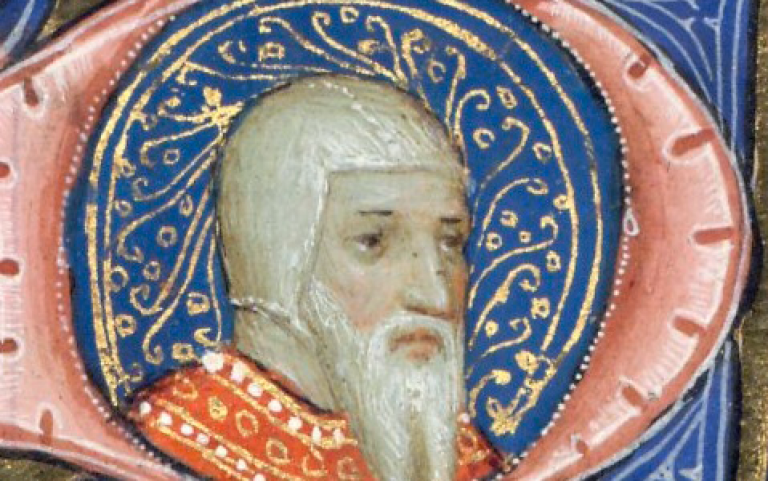Canterbury Tales is first major literary work developed as an app
3 February 2020
Geoffrey Chaucer’s Canterbury Tales is the first major literary work, in any language, to be developed into a web and mobile phone app with original scholarship, due to a new project by academics at UCL, the University of Saskatchewan (USask), and The National Library of Wales.

The free app is the first edition in a planned series. The app features a 45-minute audio performance of the General Prologue of the Tales—the masterpiece work by the most important English writer before Shakespeare—along with the digitized original manuscript. While listening to the reading, users have access to supporting content such as a translation in modern English, commentary, notes and vocabulary explaining Middle English words used by Chaucer.
The app, an offshoot of a 10-year project based at USask to digitize the Canterbury Tales, contains key new research work. This includes a new edited text of the Prologue created by USask sessional lecturer Barbara Bordalejo, a new reading of the Tales by former USask student Colin Gibbings, and new findings about the Tales by UCL medievalist Professor Richard North. The National Library of Wales offered its digitized version of the Prologue’s original manuscript for the app.
The late Monty Python star Terry Jones, who was a medievalist with two influential books on Chaucer, was also instrumental in developing the content of the app. His translation of The General Prologue and his books feature in the introduction and notes. This work on the app is thought to have been the last major academic project that Jones worked on before his passing on January 21.The app was released on Android and Apple IoS just after Jones’ birthday on February 1st, in celebration of Jones’ academic work.
Because Chaucer left the Tales unfinished at his death, there is no single text of the Tales, and scholars have to re-construct the text from over 80 distinct manuscripts, mostly written by hand before 1500.
Professor Richard North (UCL English), said: “While the app has material which should be of interest to every Chaucer scholar, it is particularly designed to be useful to people reading Chaucer for the first time. These include not only bachelor of arts university students and school children but also members of the public who have their own interest in Chaucer and his works.”
Professor Peter Robinson, University of Saskatchewan, commented: “We have become convinced, over many years, that the best way to read the Tales is to hear it performed – just as we imagine that Chaucer himself might have performed it at the court of Richard II. We are also pleased that Terry was able to see and hear this app in the last weeks of his life. His work and his passion for Chaucer was an inspiration to us.”
The team has ready materials to develop at least two more apps, in particular Miller’s Tale, the second story in the Canterbury Tales.
Professor North’s academic research on the project includes several new discoveries. For instance, he has found evidence suggesting that Chaucer's Knight, one of the main characters of the Tales, is at the siege of Algeciras near Gilbraltar, in the south of Spain, in 1369 instead of the commonly assumed date 1342-44.
Professor North said: “Algeciras was besieged earlier, by King Alfonso XI against the Muslims in 1342-44, and everyone thinks that the Knight was fighting there on the side of the Christians. The only problem with that is that the rest of his career starts about 17 years later. It makes more sense to put him there at the next siege in 1369, when Sultan Muhammad V of Granada took the city from King Enrique II of Spain. This means that the Knight was fighting Christians in the service of a Muslim emir, but that was not a problem given that Enrique was a French-backed usurper who had killed the previous king, his brother Pedro, an ally of King Edward III of England.”
North believes that putting the Knight at this siege makes his age nearer to 50 years old when we meet him with the other pilgrims in the Tabard in the General Prologue – about the age of Chaucer himself.
The General Prologue app was built around the Hengwrt manuscript of the Tales, commonly regarded as the best source for Chaucer’s text and held at The National Library of Wales. The specialist preservation and digitisation work undertaken at The National Library of Wales enabled the images of the original manuscript to be presented with supporting content for readers via the app.
The app can be found by searching “General Prologue” in PlayStore or in the App Store. It can also be accessed online: www.sd-editions.com/CantApp/GP. The project was supported by USask and by the federal Social Sciences and Humanities Research Council (SSHRC).
Links
- UCL English
- Professor Richard North’s academic profile
- ‘Chaucer General Prologue’ online app
- University of Saskatchewan Canterbury Tales Project.
- Original presentation of the manuscript by The National Library of Wales.
Image
- Credit: British Library via WikiCommons
Media contact
Natasha Downes
tel: +44 20 3108 3844
E: n.downes [at] ucl.ac.uk
 Close
Close

